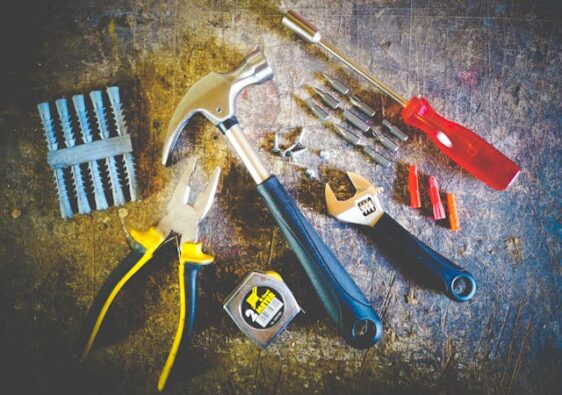Key Takeaways
- Identify common plumbing problems and understand their causes.
- Learn simple troubleshooting techniques for each issue.
- Know when to call a professional plumber for help.
Leaky Faucets
Leaky faucets are a nuisance that can lead to higher water bills and wasted resources. The constant drip often stems from worn-out washers or seals that no longer provide a tight fit. Ignoring a dripping faucet creates an annoying noise and can lead to mold growth around the sink area, requiring additional repairs.
According to the Environmental Protection Agency (EPA) report, fixing easily corrected household water leaks can save homeowners about 10% on their water bills. Addressing such leaks promptly is a small task that can lead to substantial savings and is part of maintaining an environmentally friendly household.
Clogged Drains
Clogged drains are another common issue that can severely disrupt daily activities by preventing water from flowing freely down sinks, bathtubs, and showers. Hair, soap scum, food particles, and even small objects often build up in pipes over time, leading to blockages that restrict water flow. Installing and regularly using a drain screen can help prevent these clogs from forming, as it acts as a barrier to catch debris before it enters your plumbing system. While many homeowners can handle basic plumbing repair by replacing these components, persistent leaks that do not improve with these fixes may require professional intervention to avoid water waste and potential damage over time.
For severe clogs, homeowners might initially use a plunger or a plumbing snake. These tools can often dislodge or break up blockages within the pipes. However, suppose these methods fail, or clogs become a recurring issue. In that case, it’s time to consult a professional plumber who can thoroughly clean and identify underlying problems contributing to the frequent blockages.
Running Toilets
A constantly running toilet can lead to a substantial amount of water being wasted, resulting in higher water bills and the squandering of resources. This problem is usually caused by a faulty flapper valve that fails to create a watertight seal, allowing water to flow from the tank into the bowl continuously. Switching out the flapper is a cost-effective solution that can help reduce your water bill by preventing wasteful water leakage.
In some cases, more complex issues could be at play. Problems with the fill valve, which controls the water level in the tank, or the flush handle, which may be sticking, also could cause the toilet to run. Examine these parts—if they are worn out or damaged, they should be substituted in order to restore correct operation and avoid additional water loss. Additionally, if the issue persists or if there are signs of more extensive plumbing problems, it might be necessary to consider plumbing replacement to ensure your system operates efficiently and prevents further water waste.
Low Water Pressure
Low water pressure can frustrate basic tasks, like showering or washing dishes. This issue is often caused by a buildup of mineral deposits in your pipes or fixtures, especially in regions with hard water. These deposits can restrict water flow, resulting in lower pressure. Cleaning the aerators on faucets and showerheads can improve water flow. Examine these parts – if they show signs of wear or damage, they should be exchanged to ensure they work correctly and stop any more water wastage.
If the problem persists despite this cleaning, it could indicate a more severe issue, such as a leak within the plumbing system or problems with the municipal water supply. Dealing with continuous low water pressure is crucial, as neglecting it may result in more severe problems. In such cases, getting professional assistance is advisable to diagnose and remedy the root cause swiftly and effectively.
Water Heater Problems
Water heaters are essential for household comfort, providing hot water for showers, washing dishes, and laundry. However, issues can arise with inconsistent water temperature or strange noises from the unit. Sediment buildup inside the tank is a common cause of problems. This sediment can affect the heater’s efficiency and cause it to work harder than necessary. Flushing the tank once a year can help maintain its efficiency by removing accumulated deposits.
If your water heater is old or continuously malfunctioning despite regular maintenance, it might be time to consider a replacement. Newer water heater models are more energy-efficient, have advanced features, and could save you money in the long run through reduced energy costs. Ensuring your water heater runs smoothly is critical for maintaining household convenience and energy efficiency.
Burst Pipes
Burst pipes can cause severe water damage quickly, threatening your home’s structure and belongings. Often, burst pipes are caused by freezing temperatures, which causes the water inside to expand. To prevent this, insulate exposed pipes, particularly those in unheated areas like basements and garages. Additionally, regulating your home’s temperature during colder months can help mitigate the risk.
If a pipe does burst, it is crucial to turn off the main water supply immediately to minimize damage and waste. Then, call a professional plumber to assess the situation and repair the burst pipe. According to the Weather Channel, taking proactive steps to prevent frozen pipes can protect your home and save you hundreds or even thousands in repair costs, making preventive measures worth the effort.
Sump Pump Failure
Sump pumps are crucial in preventing basement flooding, especially during heavy rains or in homes situated in low-lying areas. Regular maintenance, such as checking the pump and removing debris from the pit, is necessary to ensure it operates effectively. Periodically test your sump pump by pouring a bucket of water into the basin to check if it operates properly.
It is suggested to have a backup power source, such as a battery backup or generator, in case of a power outage to ensure the pump operates, especially during severe storms when power outages are frequent. If your sump pump fails, don’t hesitate to contact a plumber to troubleshoot and repair the issue. Intervening early can stop significant water damage and save on costly repairs that usually go along with it.
Sewer Line Problems
Problems with the sewer line can cause bad smells and sluggish draining in various fixtures, suggesting a blockage or damage in the line. Tree roots seeking moisture can infiltrate sewer lines, grease buildup can contribute to blockages, and older pipes may naturally deteriorate over time. Regular inspections and cleaning can help maintain a functional sewer line and prevent significant problems.
Professional plumbing services must address the problem effectively and safely when faced with a sewer line blockage or break. Plumbers have the ability to utilize advanced methods such as camera inspections in order to identify the specific location and cause of the problem, providing accurate and efficient remedies. Ensuring your sewer system operates smoothly is essential for maintaining a hygienic and adequately functioning household.



